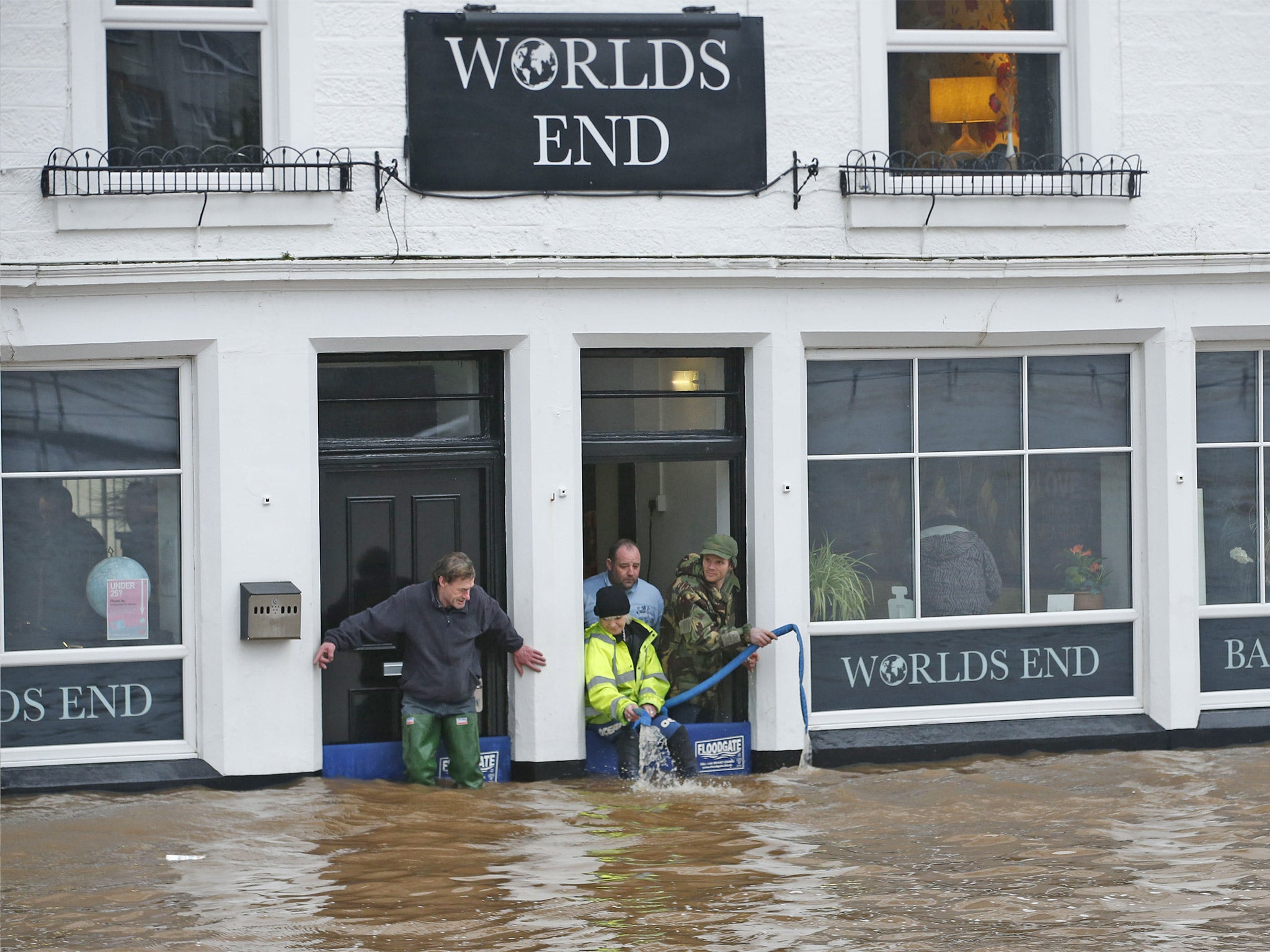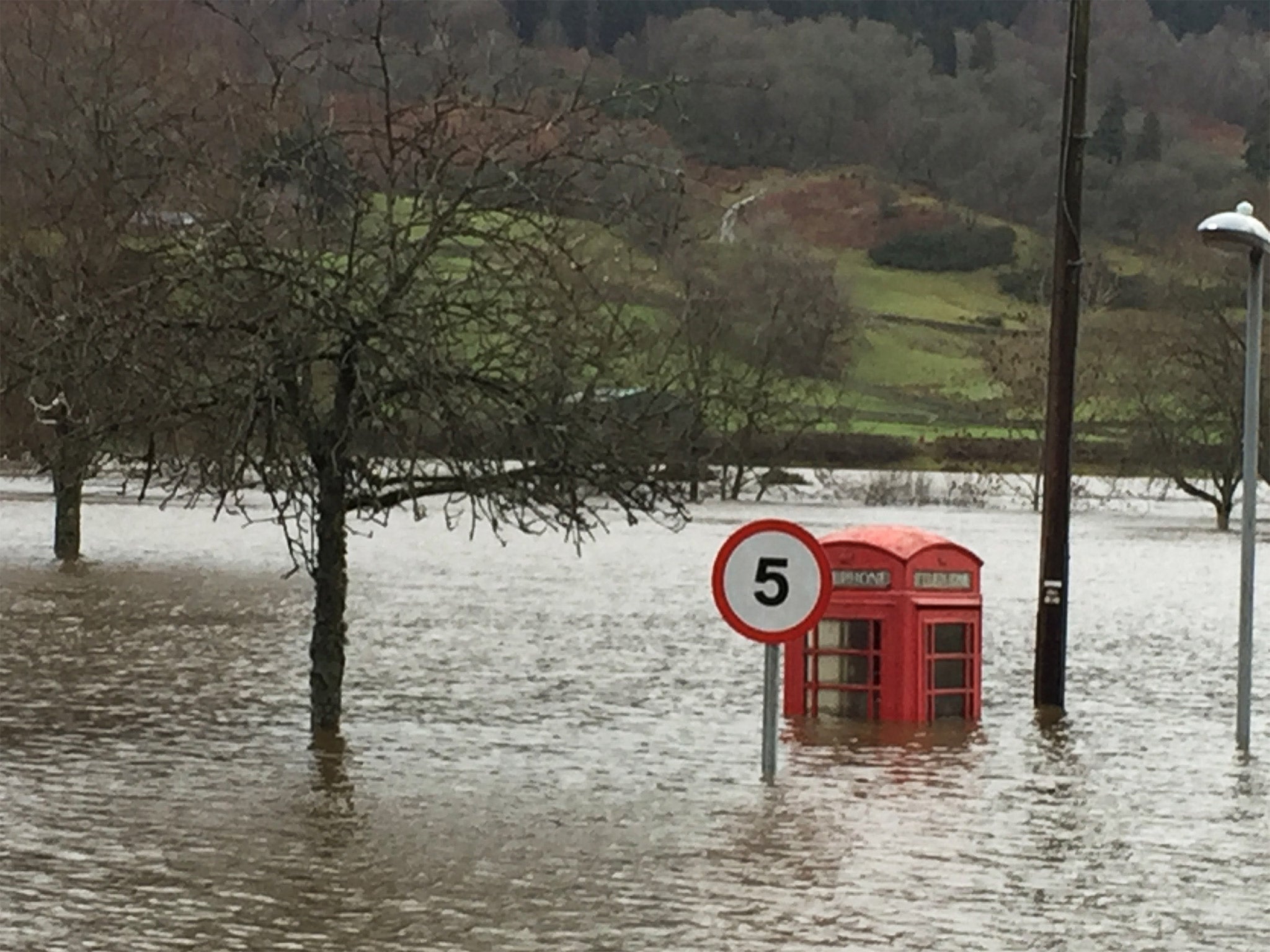Storm Frank: Thousands of homes across Britain left without power
Police Scotland issued a stage three alert for Dumfries & Galloway, Argyll and Central Scotland

Britain has been battered by another day of extreme weather as the third named storm in a month to hit the country left a trail of destruction in its wake. Thousands of homes across England, Scotland and Northern Ireland were left without power as Storm Frank caused widespread disruption.
Scotland is bracing itself for further flooding after experts warned rising levels will not peak until later on 31 December, playing havoc with New Year’s Eve plans. More than 100 flood warnings and alerts are currently in place, two of them severe – meaning a danger to life – in Whitesands, Dumfries and Galloway, and The Tweed in Peebles, on the Scottish Borders.
Rising river levels and flash floods caused havoc on roads and rail networks with ferry services halted due to high winds. Police Scotland issued a stage three alert – for a high risk of disruption – for Dumfries & Galloway, Argyll and Central Scotland.
Emergency services had to rescue 12 people trapped in a bus caught in floodwater in Dailley, South Ayrshire.
The Scottish Environment Protection Agency said that their main areas of concern were Dumfries and Galloway, the Western Borders, Tayside and Grampian and south Highland.

Although the worst rainfall is thought to have passed, some rivers will take time to respond as water moves down from higher ground towards the sea, with areas like Callander, Perth, Deeside and Speyside continuing to see rising levels on 31 December.
Vincent Fitzsimons, the agency’s Duty Hydrology Manager, said: “Rivers further east will take longer to respond. Areas like Callander, Perth, Deeside and Spey areas will continue to see rising levels throughout the day and some will not peak until the 31st.”
Dumfries and Galloway Council Chief Exceutive Gavin Stephenson said: “A lot of people are telling me this is the worst they’ve seen in their lifetime. Communities that have never been flooded before, have been flooded for the first time and of course it’s really difficult to prepare if you’ve never been flooded before so that’s one of the lessons we’ll have to learn for the future.”
People in Cumbria, Lancashire and Yorkshire breathed a sigh of relief as the worst of the weather passed them by having endured the full brunt of devastating flooding already this month. However, the worst is far from over and people in some areas were urged by officials to evacuate their homes for fear of further torrential rain on the way.

The Environment Agency had earlier warned of the potential for further significant flooding, especially in Cumbria, while Floods Minister Rory Stewart said a potentially “very bad situation” lay ahead.
More than 140 flood alerts and warnings are still in place across England and Wales, three of them severe – all at the River Yarrow in Croston, Lancashire.
Environment Agency Chairman Sir Philip Dilley cut short a family holiday in Barbados to fly back to Britain and made a secret visit to the flood-hit area of Todmorden in Yorkshire. Media were not told of the location until after he had left.
Sir Philip has been heavily criticised for staying on the tropical island over Christmas while large parts of northern England were struggling to cope with the deluge. An agency spokesman said he had been in “regular contact” with the organisation regarding its response to the current situation.
Asked if he should have visited the worst affected areas sooner, Sir Philip said: “Well I’m going up there today. My focus really is to go and see what’s happening, to see the good work that’s been going on but most importantly to see the communities who have been affected.”
Centuries old structures have been blown apart by the storms. Soldiers evacuated homes near an 18th century stone bridge in Tadcaster, north Yorkshire, after it collapsed prompting fears of flooding and a possible gas explosion after a pipe ruptured. The gas leak was soon fixed.
Environment Secretary Liz Truss, who was confronted by angry residents when she arrived in Tadcaster on 30 December, said repairing the bridge should be a “national priority”.

A spokesperson for North Yorkshire County Council said: “We will undertake a detailed assessment of the bridge as soon as it is safe to do so. The bridge structure is still dangerous and there is further risk of collapse as river levels remain high.
“We will provide further information once we have been able to assess the damage further, at which point we can consider solutions and the potential timescales involved.”
In Weston-super-Mare, part of the Victorian Birnbeck Pier collapsed into the Bristol Channel amid high winds. The pier – the only one in Britain to lead to an island - is among the 10 most endangered buildings on a list compiled by the Victorian Society.
The Grade II*-listed pier shut in 1994 after serious damage sustained during storms four years earlier and has since fallen into disrepair. Heidi Griffin from the Society said the north jetty “could not be saved” and its collapse was “nothing we weren’t expecting”.
Bristol’s Clifton Suspension Bridge in Bristol closed to vehicles because of the weather for only the second time in its 151-year history. High winds caused by Storm Frank led to 55mph gusts being recorded on the structure which spans the Avon Gorge.
Consultancy PwC raised its estimate of insured losses from the three UK Storms – Desmond, Eva and Frank, to £3bn.
Meanwhile, in York, police condemned thieves who looted homes submerged in dirty water. North Yorkshire Police’s Acting Superintendent Mark Grange said: “It is impossible to comprehend why anyone would want to bring further suffering to those who are already in a very vulnerable situation.”
Join our commenting forum
Join thought-provoking conversations, follow other Independent readers and see their replies
Comments
Bookmark popover
Removed from bookmarks